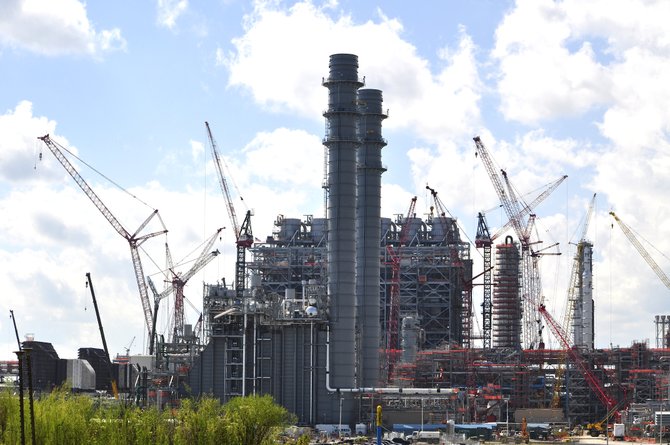Residents of Kemper County suspected that Mississippi Power Co.'s lignite electric generating station would not be ready by spring 2014 despite the busy pace of construction activity at the site. Photo by Trip Burns
Residents of Kemper County suspected, and now Mississippi Power is confirming, that the utility's 582-megawatt power plant will not be complete by May 2014. As a result, the unit of Atlanta-based Southern Co. will have to repay $133 million in federal tax credits it received with the condition of meeting the May deadline.
On a recent visit to Kemper County, residents of the rural county who live close to the plant reported a noted uptick in construction activity in recent months, presumably because Mississippi Power was trying to meet the deadline.
"You can hear the plant every day and every night," Kenny Miles, a local business owner who rents several properties to construction workers at the plant, located about near DeKalb, told the Jackson Free Press last week.
Mississippi Power President Ed Holland warned of possible delays in a recent interview with The Associated Press.
Mississippi Power Co. said that even though the Kemper power plant won't be finished by the original May 2014 deadline, it would start service sometime later that year. In a stock filing, Mississippi Power says there could be further cost overruns at the $4.75 billion project, which includes a power plant, a lignite mine and pipelines. Southern Co. has already written off $990 million in costs, but says the tax credit repayment announced Wednesday would not cause another direct charge against profits.
The company said it could seek to recover additional interest costs from ratepayers, but that would have to be approved by the Mississippi Public Service Commission.
Under construction since December 2010, the Kemper project has been plagued with delays and cost overruns that have pushed the final price tag well over the original early estimates of about $2 billion. Currently, the Mississippi State Supreme Court is considering questioning the constitutionality of the Baseload Act, which the state Legislature passed in 2008 and lets Mississippi Power increase rates before construction on Kemper is finished.
Jennifer, a former federal-government worker who lives near the power-plant construction site, also questioned the Baseload Act's fairness.
"You're forcing people to pay for something they're not receiving any benefit (in) the poorest state in the nation where people are deciding, 'Do I buy medicine or do I pay my electric bill?' I just don't see how that's looking out for Mississippi," said Jennifer, who asked that her last name not be published.
Spokeswoman Amoi Geter declined to tell the Associated Press how the company might seek repayment. In a January settlement with the PSC, Mississippi Power agreed to recover most of the interest charges from money it borrowed to build the plant through the sale of up to $1 billion in bonds. Ratepayers would repay the principal and interest on those bonds, but the company wouldn't make any profit.
Under the settlement, Mississippi ratepayers would also pay $2.4 billion of the plant's price. The PSC voted 2-1 to approve a 15 percent rate increase to start paying off the plant's debt even before it begins operations, followed by an additional 3 percent increase in 2014. Mississippi Power has said it's likely in 2014 to seek an additional increase of at least 4 percent over 20 years to pay off the bonds.
Mississippi Power received tax credits in 2009 to encourage it to build a coal-fueled power plant emitting less carbon dioxide. The company blames its inability to meet the five-year deadline on rainy weather and additional work that became necessary. The company started building the plant before it completed the design, made changes along the way, and added workers to try to make up lost time. But with 6,000 workers on the site, Holland has said things are so congested that it can be hard to squeeze workers into the same spaces, meaning the productivity of additional workers is reduced.
Northern District Commissioner Brandon Presley said meeting the deadline for the tax credits was part of the political push to get the plant approved by the PSC in 2010.
"This was part of the rush to get Kemper shoved through," said Presley to the AP. Presley has consistently opposed the plant.
Monitors employed by the Public Service Commission had warned work was behind in recent months.
"For a project this size, it's not unusual or surprising to me that there's a delay in the completion date," recently appointed District Commissioner Steve Renfroe told the AP. Renfroe is a former employee of Chevron Corp.'s massive refinery in Pascagoula.
The Associated Press contributed to this story.



Comments
Use the comment form below to begin a discussion about this content.
comments powered by Disqus